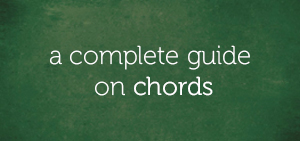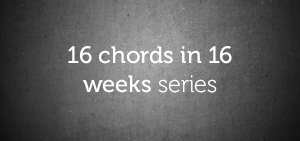We’ll be experimenting with the So What chord in this lesson by playing it over a variety of bass notes.
The So What chord is the voicing of the minor eleventh chord and if you play it on D:
…that’s the D So What chord:
…which is typically a rearrangement of the D minor eleventh chord:
…using fourth intervals.
A lot of people love the sound of the So What chord, but are limited in its application because it’s a minor chord voicing. They usually ask questions like “considering that the So What voicing is a minor voicing, what do I do when it’s time to play major and dominant voicings?”
I’ll be answering this question today. But most importantly, I’m going to take you by the hand and walk you (step-by-step) through the experimentation of the So What chord over a variety of bass notes.
Let’s get started!
The So What Chord Voicing Over A Variety Of Bass Notes
Although the So What chord functioned as a minor chord the first time it was used in a recording, that’s not enough reason why it should be limited to minor chords.
The D So What chord:
…is primarily a minor chord and this is because the bass note is D:
If we go beyond the D bass note and experiment with other bass notes, you’ll realize other chord types — major, dominant, 6/9, etc.
Are you ready for the experiment?
You’re sure?
Alright!
The Bass Note Experiment Of The So What Chord Voicing
If you play the So What chord voicing over a variety of bass notes, you’ll find out other possible applications of the So What chord.
Although there are specifically four other voicings that we’ll be covering in this lesson, I’ll be taking you step-by-step, from one bass note to the other.
“Over The C Bass Note…”
Playing the D So What chord:
…over C on the bass:
…does not give us any distinct chord. Except for classically trained musicians and scholars who may want to see it as a third inversion chord.
“Over The Db Bass Note…”
The Db bass note:
…and the D So What chord:
…are foreign to each other when played together:
So, the Db bass note is definitely NOT one of the bass notes we’re looking out for.
“Over The D Bass Note…”
Yes! It’s a D bass note:
…over a D So What chord:
…and that gives us an overall D minor eleventh chord:
…which can either be a 2-chord, 3-chord, or 6-chord in the key of C major, Bb major, and F major respectively.
“Over The Eb Bass Note…”
Playing the D So What chord:
…over the Eb bass note:
…produces the Eb major thirteenth [sharp eleventh]:
…which is an extended major chord that sounds very sophisticated and most importantly; does not have an avoid note (the fourth tone of the major scale.)
“Over The E Bass Note…”
There’s also no distinct chord formed by playing the D So What chord:
…over the E bass note:
You’ll have a Dmin11/E chord:
…by the way.
“Over The F Bass Note…”
The D So What chord:
…over the F bass note:
…produces the F 6/9 chord:
…which is a great option for the 1-chord and 4-chord in the key of F major and C major respectively.
“Over The F# Bass Note…”
The F# bass note:
…is foreign to the D So What chord:
…and forms an overall Dmin11/F# chord:
…when played together.
This is NOT a distinct voicing. Therefore, let’s go on to the next bass note — the G bass note.
“Over The G Bass Note…”
The D So What chord:
…sounds great over the G bass note:
…and produces an overall G dominant 9sus4 chord:
…which is a tasteful dominant chord option.
Attention: The Ab and A bass notes too don’t produce any distinct chord voicings. So, I’ll take you to the Bb bass note — another major thirteenth voicing.
“Over The Bb Bass Note…”
The Bb bass note:
…is a great bass note option for the D So What chord:
…and this is because of the overall Bb major thirteenth chord that is formed:
…which is a 1-chord in the key of Bb major:
…and a 4-chord in the key of F major:
Attention: Keep in mind that the Bb bass note is the last bass note that can form a distinct chord with the D So What chord. So, we’re not going to bother taking a look at the B bass note.
Final Words
This is how far anyone can possibly go while experimenting with the So What chord.
Apart from the D bass note that produces the minor eleventh chord, the So What chord can be played over four other bass notes to produce the following chords:
Major thirteenth [sharp eleventh]
6/9
Dominant 9sus4
Major thirteenth
…and I’m very certain that there could be more options. I only did the best I could; to milk other chord qualities out of the So What chord voicing.
In a subsequent lesson, we’ll be playing scale tone chords using the So What chord voicing.
I’m looking forward to sharing with you how these chords (major thirteenth [sharp eleventh], 6/9, dominant 9sus4, and the major thirteenth) can be applied in the major key.
See you you then.
Chuku Onyemachi
Latest posts by Chuku Onyemachi (see all)
- CHORD UPGRADE: How To INSTANTLY Upgrade Triads And Seventh Chords To Ninth Chords
- The Formation Of Diminished Seventh Chords Used To Be Challenging Until I Did This
- How To Form Seventh Chords In Two Shakes Of A Dog’s Tail Using Third Intervals And The Circle Of Fifths Chart
- I Played The 13sus4 Chord And This Happened…
- How To Build Seventh Chords Like An Architect Using “Foundation And Structure” Concept







Comments on this entry are closed.